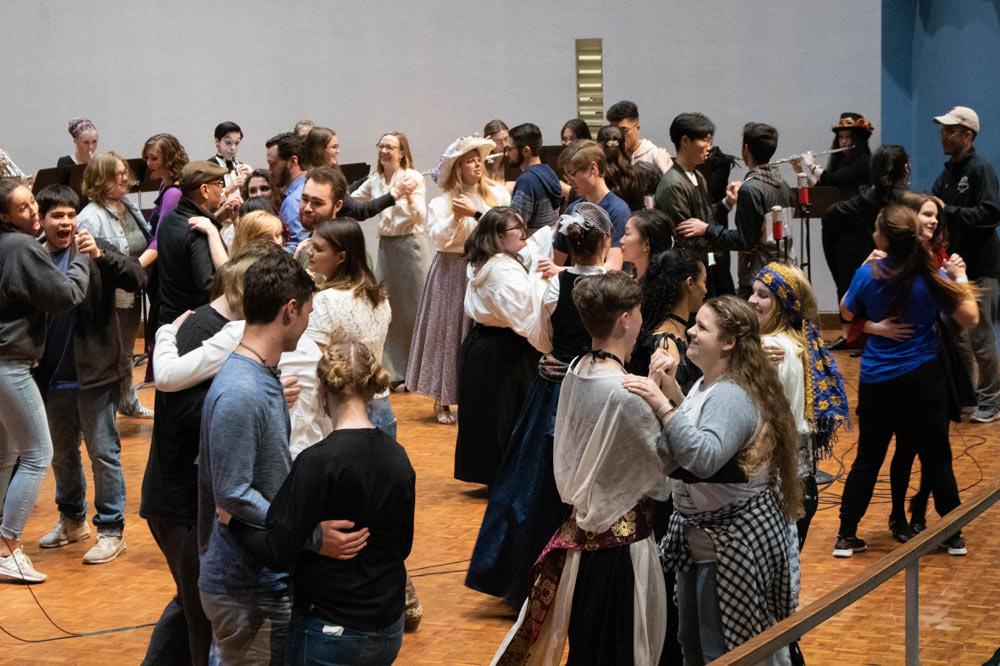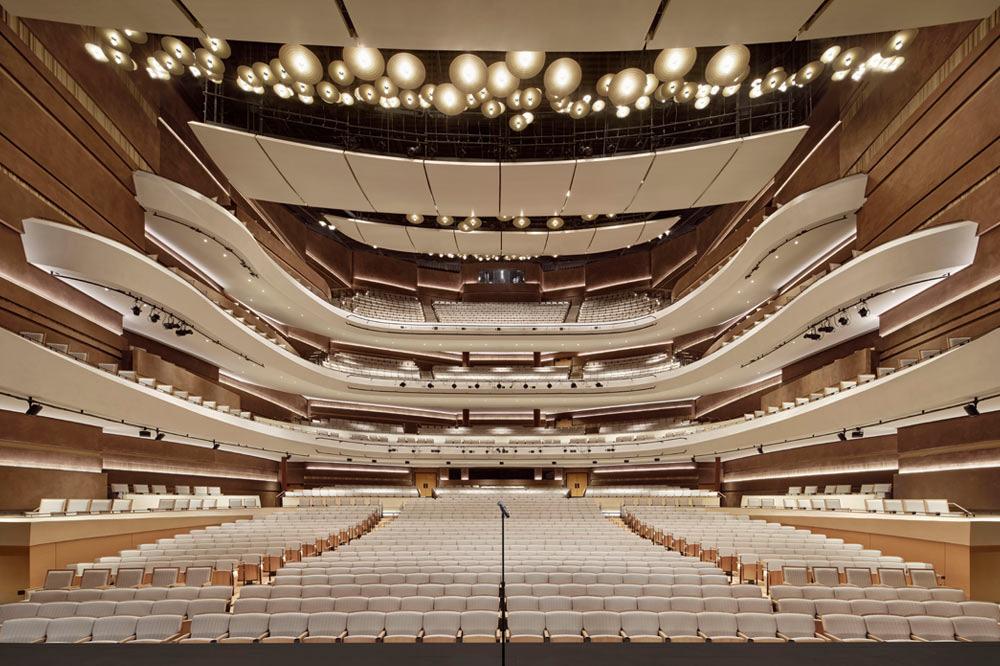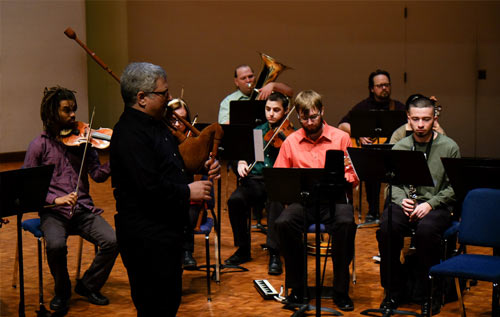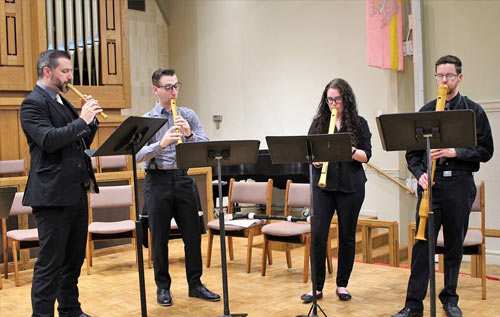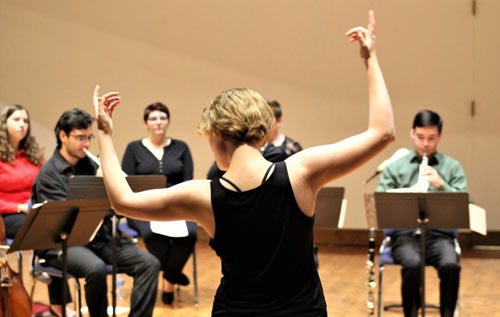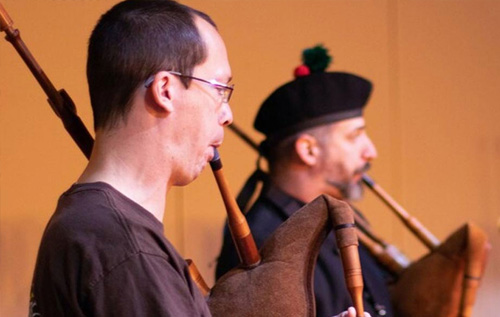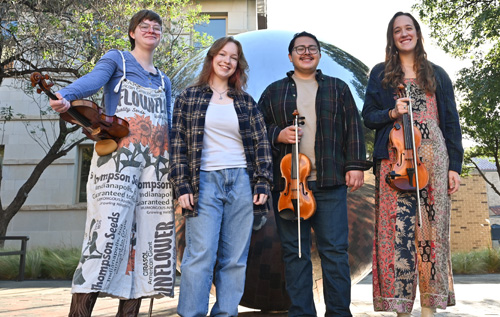
School of Music
Vernacular Music Center

Vernacular Music Center
The VMC engages with folk and traditional music and dance from around the world: "vernaculars" that are learned, taught, shared, and passed-on by ear and in the memory, with the arts of improvisation and performance practice, and with practice-based research and publication about them, as they intersect with history, culture, and community. The VMC is likewise dedicated to the study of the "vernacular" processes by which music and dance can be taught and passed on as a community-building activity, as well as assisting in the ongoing cultivation of arts in the American Southwest, across the country, and around the globe.
“I want to live in the whole world of music.” – Henry Cowell
What We Do
The mission of the TTU Vernacular Music Center (founded 2000) is to provide a center for in-depth interdisciplinary research, study, teaching and advocacy on behalf of the world's vernacular musics and dance—their construction, history and role in defining cultural life in human communities— in all cultures and historical periods, and the contributions they can make in the modern world. It is the first research center housed within the Talkington College of Visual and Performing Arts to be officially recognized by the Office of the Vice President for Research and Innovation. The VMC is an innovator in building partnerships and generating outside funding for these initiatives, with grants to the Fulbright Foundation, the National Endowment for the Arts, and Civic Lubbock.
The Texas Tech VMC offers graduate and undergraduate courses and ensembles, open to students in music, dance, fine arts, arts & humanities, social sciences, business, law, and international public policy. The VMC emphasizes "teaching across the curriculum,” drawing on the expertise of a faculty team from a range of disciplines. Ample opportunities are provided for students’ interaction with visiting scholars and guest teachers. The VMC serves as both a liaison and consultant for partners such as learned societies, archives, non-profits, museums, public broadcasting, and private corporations.
A central and unique part of the VMC's core mission is the training of young arts professionals: young singers, dancers, players, teachers, and organizers who, through their VMC experience, are empowered to advocate for and lead vernacular art initiatives in their own campuses, communities, and future activities. Our students apprentice in the skills of combining speaking, playing, singing, dancing, and teaching on behalf of participatory community arts; such activities are part of every VMC initiative. We particularly emphasize team- and project-based learning, within which developing arts professionals collaborate to create performances, new works, and new initiatives; a glance at the list of “VMC Past Productions” provides examples. VMC alumni are uniquely positioned as advocates within and beyond the university: on curriculum committees, to state education coordinating boards, ISD school boards, and Boards of Regents, but also to other arts organizations, educators, and community leaders.
VMC alumni embody and promulgate cultural diversity and a vision of inclusive excellence. This aspect of the Mission is coalesced by the VMC Scholarships program, but all VMC students and alumni are powerful and capable advocates in support of our ideals.
The VMC serves as a foundation organization for the study, appreciation, and support of vernacular music and dance within academics and the community at large. We also sponsor a calendar of special projects, and annual arts and cultural events, which are open to students and public alike.
our expertise
The VMC teaching cohort includes experts in performance and cultural aspects in Latinx musics of Mesoamerica and the Caribbean; many North American vernaculars; Mediterranean and Balkan musics; Medieval/ Renaissance / Baroque idioms; musics of North Europe; of West and North Africa; North American contemporary pop, rock, and jazz styles; and much more. In many cases, genre and period experts on the staff also lead ensembles engaged with these same repertoires, thus exemplifying our valuation of the scholar/performer. The Vernacular Music Center has its own rehearsal and study space, and a small but very carefully-curated collection of instruments from around the world, available for use by students involved in ensembles.
15-hour Certificates
The Vernacular Music Center sponsors a number of graduate and undergraduate “Certificates”: 15-hour (5 course) combinations which appear on the student’s transcript and confirm their special interest and expertise in the following topics:
- Vernacular Music (undergraduate and graduate)
- Historical Performance Practice (graduate)
- Community Arts (undergraduate)
Social Media
The VMC makes extensive use of contemporary social media for outreach, engagement, education, and recruitment, including:
Want to hear more about VMC Ensembles and other activities? Check out these streaming shows!
The VMC is also the originating partner, with the production company Reciprocal Studios, of two three successful podcasts:
- VOICES FROM THE VERNACULAR MUSIC CENTER: hosted by Roger Landes and Chris Smith, which places the directors of the VMC in conversation with players, singers, dancers, builders, historians, and global partners from around the world.
- SOUNDING HISTORY: hosted by Chris Smith and Tom Irvine (University of Southampton UK), which provides a "global sonic history of the Anthropocene" (e.g., the era of human impact upon the globe, c1500 to the present), and supports a major co-authored monograph. In Series II, SOUNDING HISTORY partners the University of Southampton UK with the TTU Honors College, Sowell Collection, OIA's Global Partnerships program, and the College of Visual and Performance Arts.
- HARMONIA: hosted by Angela Mariani. Early music on public radio.
The Musicology program and the Vernacular Music Center partner closely with the Performing Arts Research Lab, the School of Theatre & Dance, and with a diversity of regional and community organizations.
School of Music
-
Address
2624 18th Street | Box 42033 | Lubbock, TX 79409-2033 -
Phone
806.742.2274 -
Email
schoolofmusic@ttu.edu


